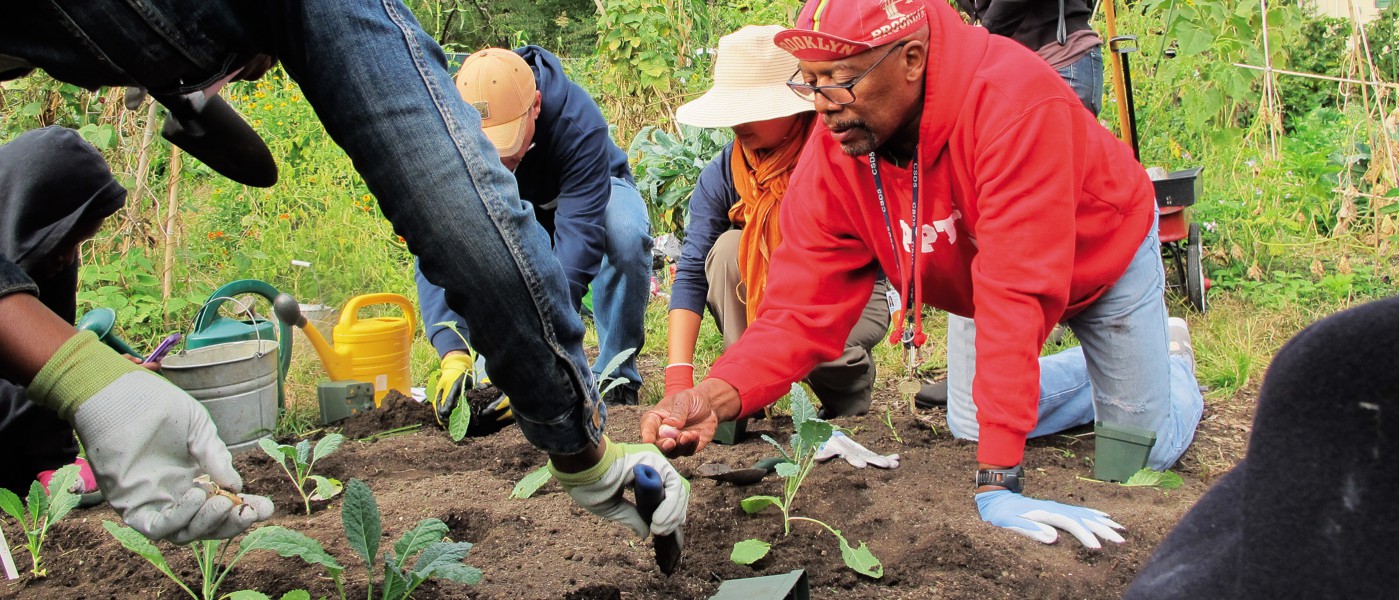Brooklyn Urban Gardener Certificate Program
BBG’s Real-Life Training Program for Community Volunteers
Learn + Grow + Connect + Serve

The Brooklyn Urban Gardener (BUG) certificate program is an annual multiple-session course that covers the basics in urban gardening and community greening. It connects the educational resources of Brooklyn Botanic Garden to the greening efforts of Brooklyn’s communities.
Upon completing all coursework, graduates are certified as Brooklyn Botanic Garden BUG volunteers. Certified BUGs then continue to support greening projects at schools, senior centers, block associations, community gardens, and other organizations.
BUG students can expect an experiential, train-the-trainer program. Using a hands-on, participatory education model, the course includes instruction in sustainable horticultural practices suited to the urban environment, street tree stewardship, community engagement practices, effective teaching methods, and an overview of the greening resources available in Brooklyn. The training is free.
Application
Deadline to apply is June 1, 2025.
Apply for the 2025 programA select number of applicants are chosen to participate in a group interview. From those, the class of 15 students is chosen and announced in July. Previously unsuccessful applicants are encouraged to reapply. Classes begin in mid–September and run into November.
If you have any questions, email [email protected] or call 718-623-7250.
FAQ
The BUG certificate program is a multisession course, held once annually during fall and winter. Classes are held on weekend afternoons (1–5 p.m.) and Thursday evenings (6–9 p.m.). Sessions take place from mid-September through November. Personal portfolio and study group activities extend into November when BUGs graduate.
The BUG program is completely free. This training is designed for people who intend to volunteer on an ongoing basis throughout Brooklyn on greening projects referred by Brooklyn Botanic Garden, or of their own devising. We ask that BUGs serve at least 20 hours per year after graduation to maintain BUG certification.
It’s significant. Students are expected to attend every session of class (25 hours), do required reading and homework each week, attend study group meetings, and create a portfolio of their work in time for a graduation event held in November.
After graduating, BUGs are regularly informed of community greening projects seeking volunteer support. To maintain certification, BUGs are expected to continue to volunteer at least 20 hours per year.
One way is to attend the next Making Brooklyn Bloom conference, held at Brooklyn Botanic Garden each March. Lots of BUG graduates are on hand to help answer questions.
Questions? Contact us at [email protected] or 718-623-7250.
More questions? Contact Brooklyn Botanic Garden’s Community Greening staff at [email protected] or 718-623-7250.
Support
Brooklyn Botanic Garden gratefully acknowledges support for this program from the NYS Office of Parks, Recreation and Historic Preservation, the NYS Assembly and NYS Senate, NYC Department of Cultural Affairs, and the NYC Council.

